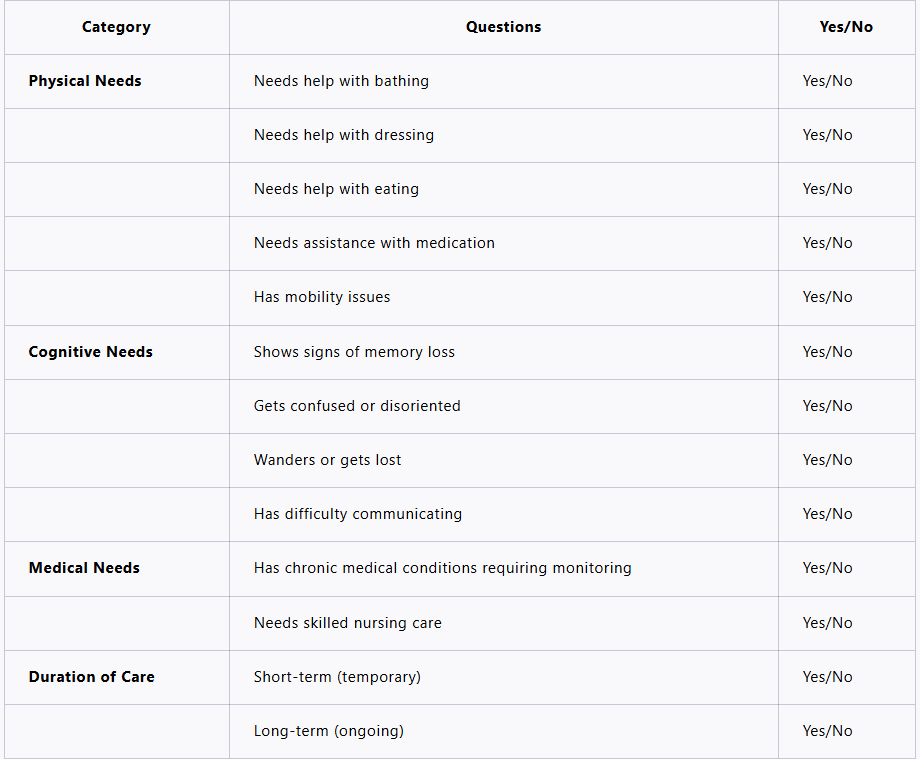
March 28, 2025
Assessing Your Loved One's Needs: Which Type of Care is Best?
This comprehensive analysis explores the process of assessing a loved one's needs to determine the most suitable type of care among assisted living, memory care, and rehabilitation centers, tailored for a senior advisor website focused on consulting services. The analysis is grounded in extensive research into senior care options, drawing from various online resources to ensure a thorough understanding of client needs and advisor guidance, as of the current time, 05:49 PM EDT on Friday, March 28, 2025.
Introduction and Importance
Choosing the right care for a loved one is a pivotal decision that significantly impacts their quality of life and well-being. With the aging population increasing, the demand for senior care services is rising, and understanding the differences between assisted living, memory care, and rehabilitation centers is essential for making informed choices. This analysis aims to provide a step-by-step guide for assessing needs, ensuring families can navigate this complex process with clarity and confidence.
Defining Care Types
To begin, it's crucial to define each type of care to clarify their purposes and suitability:
- Assisted Living: These communities are designed for seniors who need help with daily activities but do not require full-time medical care. Services typically include assistance with bathing, dressing, eating, medication management, and housekeeping. Residents often have their own apartments and can enjoy social activities and amenities, as noted by Cedarhurst Living. This setting is ideal for those seeking a balance between independence and support.
- Memory Care: Specifically tailored for individuals with cognitive impairments such as Alzheimer's disease or dementia, memory care provides a safe and secure environment with staff trained to handle memory-related issues and behaviors. They offer specialized programs and activities to engage residents and support cognitive abilities, as highlighted by A Place for Mom. This type of care is crucial for managing conditions that affect memory and safety.
- Rehabilitation Centers: These facilities focus on short-term care to help individuals recover from illnesses, injuries, or surgeries. They provide intensive therapy, including physical, occupational, and speech therapy, to aid in the recovery process, with the goal of restoring function and independence. According to Seniors Guide, rehabilitation centers can be standalone or part of senior living communities, offering various levels like basic, sub-acute, and acute care depending on the senior's needs.
Step-by-Step Guide to Needs Assessment
The assessment process involves several steps to ensure the chosen care aligns with the loved one's current and future needs:
Determine the Duration of Care Needed:
- The first step is to determine if the care needed is short-term or long-term. Short-term care is typically for recovery from a specific event, such as surgery or illness, making rehabilitation centers appropriate. Long-term care is for ongoing support due to chronic conditions or aging, leading to a choice between assisted living and memory care. This distinction is crucial, as noted by Where You Live Matters, which outlines levels of care based on the length of stay and health state.
Assess Specific Needs for Long-Term Care:
-
For long-term care, assess the loved one's physical and cognitive needs:
- Physical Needs: Evaluate if they need help with activities of daily living (ADLs) such as bathing, dressing, eating, and medication management. Assisted living is suitable if these are the primary needs, as per Arbor Company, which explains levels of care within assisted living.
- Cognitive Needs: Check for signs of memory loss, confusion, wandering, or difficulty communicating. If cognitive impairments are significant, memory care is better suited, as detailed by Buckner Calderwoods, which emphasizes the specialized environment for dementia care.
Obtain a Medical Assessment:
- Consult with the loved one's doctor to understand their current physical and cognitive health. A comprehensive health evaluation can provide recommendations on the best type of care, ensuring alignment with medical needs. This step is supported by WebMD, which stresses the importance of health assessments for determining care levels.
Consider Preferences and Lifestyle:
- Involve the loved one in the decision-making process to ensure their preferences and lifestyle needs are met. Look for communities that offer activities and amenities aligning with their interests, such as social clubs or pet-friendly policies, as mentioned by SeniorLiving.org. This personalization enhances their comfort and satisfaction.
Visit Potential Communities:
- Tour both assisted living and memory care facilities if long-term care is needed, and for rehabilitation centers, check their therapy programs and success rates. Ask about staff qualifications, resident-to-staff ratios, and the overall environment. Visiting helps evaluate if the community can meet specific needs, as advised by Village Walk Senior Living, which suggests assessing security and staff training for memory care.

